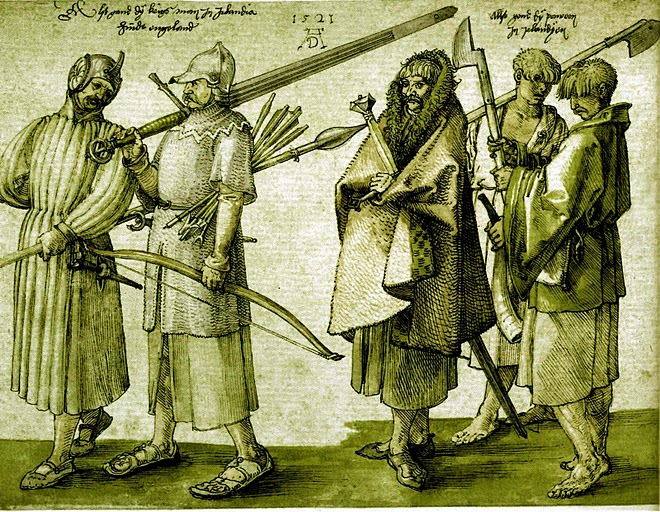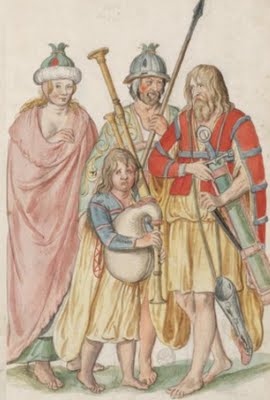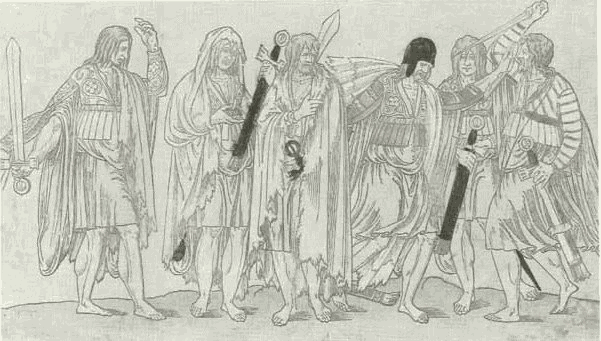How common was the use of leather(either normal or hard boiled) armor during the 16th century?
Specifically Im wondering about the galloglaigh armor, and all of the resources Ive poured through only list chain mail for the torso and upper arms/upper legs, and a helmet. However I know that it was almost universal for the time period for soldier to go into battle with at least minor protection for their hands and lower arms. In my mind, it seems likely they would have used leather armor as it provides a reasonable degree of protection, and was more readily available to the irish than plate armor.
If anyone has any direct historical references I'd greatly appreciate pictures or links to them.
Please be more specific as to what Irish troops you are inquiring about.
Jack
Jack
Im not particularly knowledgable of the fine details about the Irish, but for this much I can say that leather armour was not really used for lower arm defences. Perhaps maybe leather or hide gloves but no real arm defences exept maybe for those of higher standing but for say the galloglaigh, none that I ever saw in artwork.
Mail hauberks and padded armour with various types of helms seem to be the only armour they might have worn.
I dont remember any sources of hand but I do have a depiction of Irish soldiers drawn in 1521 by Albrecht Durer.
Hope it helps.
Regards.
 Attachment: 177.09 KB
Attachment: 177.09 KB

Mail hauberks and padded armour with various types of helms seem to be the only armour they might have worn.
I dont remember any sources of hand but I do have a depiction of Irish soldiers drawn in 1521 by Albrecht Durer.
Hope it helps.
Regards.

| Jack W. Englund wrote: |
| Please be more specific as to what Irish troops you are inquiring about.
Jack |
The galloglaigh. Also known as gallowglass or Gall oglaigh, depending on pronunciation and time period. If you need more specific than that, the MacAoidh or MacDonnel families, serving under the Ui Nialls.
Rob, welcome to myArmoury
we have a spotlight topic thread here on Irish Arms and Armour
http://www.myArmoury.com/talk/viewtopic.php?t=5844
Lots of changes in weapons and armour over the course of the 16th c so you might have to narrow your time frame for your question. Leather was certainly being used as armour late in the 16th c in the form of the buff and/ leather jerkins. But we don't have any references for specific leather forearm defences as far as I know. I have raised this issue of forearm defence before, we don't have much in the way of references for forearm defence at all beyond the cotun, leine, and mail. A well layered and quilted cotun sleeve does provide a generous amount of protection to the arm. I have a reproduction from Matuls and it is surprisingly robust protection. We do have refernces to the cotun being "pitched" and/or "tarred" as well. tr
we have a spotlight topic thread here on Irish Arms and Armour
http://www.myArmoury.com/talk/viewtopic.php?t=5844
Lots of changes in weapons and armour over the course of the 16th c so you might have to narrow your time frame for your question. Leather was certainly being used as armour late in the 16th c in the form of the buff and/ leather jerkins. But we don't have any references for specific leather forearm defences as far as I know. I have raised this issue of forearm defence before, we don't have much in the way of references for forearm defence at all beyond the cotun, leine, and mail. A well layered and quilted cotun sleeve does provide a generous amount of protection to the arm. I have a reproduction from Matuls and it is surprisingly robust protection. We do have refernces to the cotun being "pitched" and/or "tarred" as well. tr
It appears the Irish used single gauntlets in someway also. These are the 2 depictions I know of. I would like to hear opinions on it.
 Attachment: 19.71 KB
Attachment: 19.71 KB

 Attachment: 93.99 KB
Attachment: 93.99 KB



Why didn't they wear shoes?
I may be wrong about this, but a lot of the irish did wear shoes, or boots, or a type of sandal similar in appearance to a roman sandal, all of which were made from leather(as the majority of the irish were cattlemen, they had an abundance of milk, butter, meat, and finally.. leather). However, the terrain they lived on was not hard rock or anything that would cause a terrible amount of wear and tear on your feet, and the irish held a major belief that speed and maneuverability was the key to any battle, which is also why you don't see a lot of plate armor till the late 16th and early 17th centuries. Its possible the irishmen depicted in these paintings did walk around barefoot until it came time for battle.
This preference served them well in their homeland where they preferred launching quick strikes and retreating back across bogs where any pursuit that wore armor heavier than leather usually ended up sinking into the ground until the irish doubled back and finished them off.
I do have some references which suggest a single plate gauntlet on the offhand served in place of a shield for the purposes of deflecting and grabbing swords, but these come largely from other European countries fighting styles.
This preference served them well in their homeland where they preferred launching quick strikes and retreating back across bogs where any pursuit that wore armor heavier than leather usually ended up sinking into the ground until the irish doubled back and finished them off.
I do have some references which suggest a single plate gauntlet on the offhand served in place of a shield for the purposes of deflecting and grabbing swords, but these come largely from other European countries fighting styles.
| Adam D. Kent-Isaac wrote: |
| Why didn't they wear shoes? |
Ahh, as stated above they did & did not.
Most of the people ( except the wealthy ) spent the majority of their lives "barefoot", ( many even into the 1800s in many areas)
Jack
Many non-European people all across the world still spend most of their lives barefoot even today. I certainly do.
Not trying to derail the topic, but in the same spirit of "why didn't they wear shoes". Why is it that the Irish cavalry never adopted the stirrup, when they had plenty of contact with people who did?
Its possible they never had the time/technology. Cavalry was already on the way out during the 16th century, as more and more knights fell to the invention of gunpowder.
Well Rob, the Irish had been in contact with the Normans since the 12th century, and before that the Vikings, and even before that the Irish were raiding Britain. So I'm not sure when exactly the stirrup came to Britain but I'm sure the Irish would have known about it.
I agree. However the irish used the pillow "saddle" without stirrups up through the 16th century. Why they did this is anyones guess. Mine is that though they had contact with that kind of technology, they never developed it themselves, much like the gun.
Hi,
what's amazing is that except the sword type, some of those drawings could have represented some people of La Tene period,
Just watch the the warrior with the Celt (sure it is) helmet behind the kid playing bagpipes!
what's amazing is that except the sword type, some of those drawings could have represented some people of La Tene period,
Just watch the the warrior with the Celt (sure it is) helmet behind the kid playing bagpipes!
I think it has to do with the fighting style and the way cavalry was typically used in Ireland at the time. Its hard to fully comprehend today, but Ireland circa 1500 was a very heavily forested island. Cavalry was typically used in a skirmishing and scouting role. Even in some of the larger battles like Knockdoe, the cavalry in Burke's army did not form up and charge. They skirted around and hit the baggage train from the rear. Horse was also used to cover a retreat or the escape during a creagh. Although we don't have any pictorial depictions, there is evidence that in addition to the javelin thrown overhand from horse, the Irish also used their bows from horseback.
By the mid 16th century though the Irish were using stirrups, certainly that is true by the end of the century and Tyrone's rebellion.
By the mid 16th century though the Irish were using stirrups, certainly that is true by the end of the century and Tyrone's rebellion.
Thom, I'm aware of the role that cavalry played in Irish warfare, but wouldn't the same role be easier with stirrups.
Ok heres a question more in line with the original topic. If you look at the Ashnolean sketch (second picture posted by Kevin), the third figure from the right appears to be wearing a leather helmet, at least it's coloured the same as scabbards and sword grips. So does anyone here know of any other evidence for leather helmets at this time in Ireland?
I can't remember what they're called, I want to say a "cathbar". We think they were made of leather and had mettle straps on them for extra protection.
This guy made a pretty good repo of one; http://livinghistory.ie/viewtopic.php?f=7&...t&sd=a
This guy made a pretty good repo of one; http://livinghistory.ie/viewtopic.php?f=7&...t&sd=a
Hey Zack, from memory, cathbar is just a general term in Irish for helmet. IIRC the helmet from that thread is based on an interpretation of John Derricke's Image of Irelande, personally I'm not sure that I would agree with this this interpretation. I was thinking of an all leather helmet, which is what I believe is what is shown in the Ashnolean sketch seen above.
Page 1 of 1
You cannot post new topics in this forumYou cannot reply to topics in this forum
You cannot edit your posts in this forum
You cannot delete your posts in this forum
You cannot vote in polls in this forum
You cannot attach files in this forum
You can download files in this forum
All contents © Copyright 2003-2006 myArmoury.com — All rights reserved
Discussion forums powered by phpBB © The phpBB Group
Switch to the Full-featured Version of the forum
Discussion forums powered by phpBB © The phpBB Group
Switch to the Full-featured Version of the forum